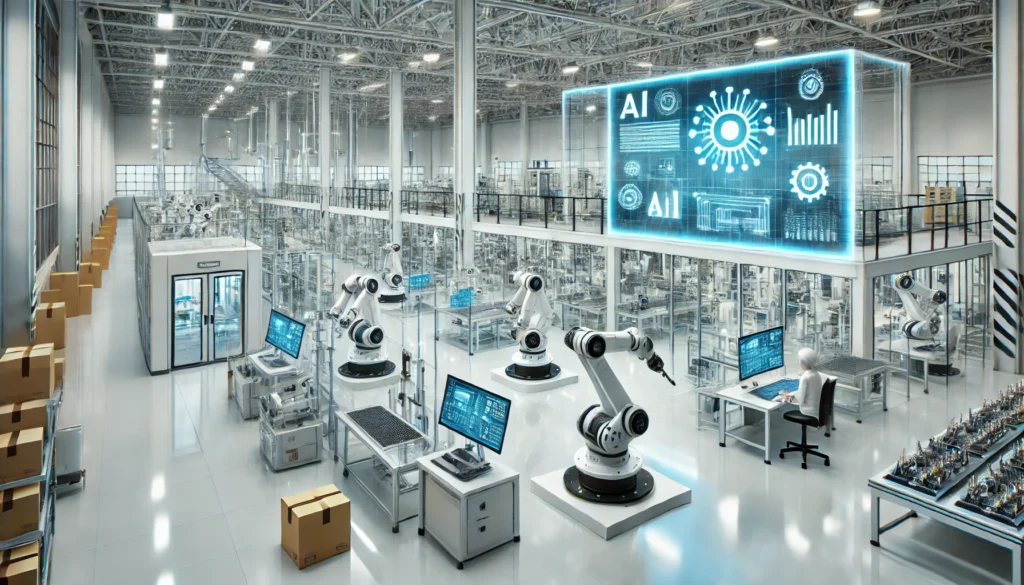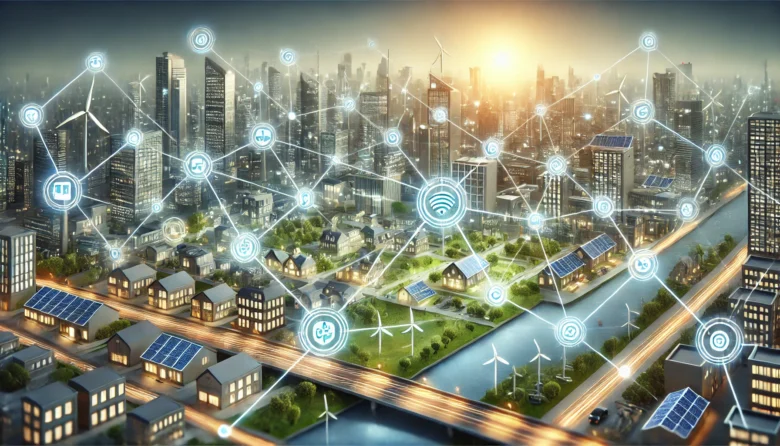Fun Fact: Did you know that sustainable businesses often have higher customer loyalty and brand trust than non-sustainable ones?
In today’s fast-paced, technology-driven world, businesses face increasing pressure to adopt sustainable practices not only to protect our environment but to stay competitive. “The Role of Technology in Business Sustainability” is more crucial than ever as companies turn to innovative tools to cut costs, reduce waste, and deliver more eco-friendly services. From small startups to industry giants, technology is reshaping business sustainability, offering new ways to operate with purpose while ensuring long-term profitability.
Let’s explore how technology is paving the way for sustainable business practices and examine some real-world examples to see how impactful these changes can be.
Optimizing Operations with Data Analytics
One of the first ways technology supports sustainability is through data analytics. By gathering and analyzing data, companies can identify inefficient practices, optimize resource usage, and make informed decisions for better energy conservation.
For example, Walmart, a multinational retail corporation known for its vast supply chain, leverages data analytics to monitor its energy consumption and optimize delivery routes. By analyzing the data from every aspect of its operations, Walmart has reduced waste and cut down fuel usage across its fleet. These efforts allow the company to deliver products with less environmental impact, improving their operational efficiency and customer loyalty.
Case Study: Unilever’s Data-Driven Sustainability
Unilever, a global consumer goods company, uses data analytics extensively in its manufacturing process. With real-time data, Unilever tracks its use of water, energy, and raw materials, reducing waste and costs across its global supply chain. By committing to measurable data-driven goals, Unilever successfully reduced CO2 emissions and improved water efficiency by over 40%, demonstrating the tangible impact of data analytics on business sustainability.

Renewable Energy and Smart Grids
Switching to renewable energy sources like solar, wind, and hydropower can significantly reduce a business’s carbon footprint. But technology has taken it a step further with smart grids, enabling companies to monitor and manage their energy use in real-time efficiently.
Google, the technology giant behind the world’s most popular search engine, has invested heavily in renewable energy, aiming to operate entirely on renewable energy across its data centres. They’ve pioneered a unique approach by using artificial intelligence (AI) to predict energy needs, minimizing their energy consumption. Additionally, Google’s smart grid investments ensure efficient power usage, helping it become a global leader in sustainable tech.
Example: Tesla’s Impact on Solar Energy
Tesla, known for its electric vehicles and clean energy initiatives, has introduced solar roof tiles that allow businesses and homeowners to harness renewable energy seamlessly. By providing clean energy solutions, Tesla offers an eco-friendly alternative to traditional power, demonstrating how renewable tech can support sustainable business practices.
AI and Automation for Efficient Production
AI (Artificial Intelligence) and automation streamline production, reduce waste, and optimize resource use. Companies use automation to ensure that every stage of their production process aligns with sustainability goals.
Take Procter & Gamble (P&G), a major player in consumer goods, known for brands like Tide and Pampers. P&G employs AI-driven automation to reduce water use in their detergent production process. With AI monitoring, they minimized waste while ensuring product quality, promoting both sustainability and efficiency.
Real-World Example: Microsoft’s Water Conservation Efforts
Microsoft, a technology giant, harnesses AI to manage water usage in their data centres. Using sensors and automated systems, Microsoft can track water consumption at each stage of cooling its servers, a necessity for tech companies. By adopting such innovative technology, Microsoft conserves water and enhances its operational sustainability, demonstrating AI’s transformative role in responsible resource management.
Blockchain for Transparent Supply Chains
Blockchain technology is well-known in the finance world, but it’s now making waves in business sustainability. Blockchain provides a decentralized, secure way to track each stage of a product’s journey, making it an excellent tool for ensuring ethical and sustainable sourcing.
Nestlé, the global food and beverage company, uses blockchain to provide transparency in its supply chain, particularly with coffee and cocoa. Blockchain technology allows Nestlé to trace the origin of its raw materials, ensuring that their products come from sustainable sources. This transparency boosts customer trust, as consumers know they are supporting ethical, environmentally-friendly practices.
Example: IBM Food Trust
IBM’s Food Trust is a blockchain-based solution that connects farmers, suppliers, and retailers to ensure transparent supply chains. Major retailers like Walmart and Carrefour use IBM’s system to track food items, ensuring their supply chains are environmentally friendly. By using blockchain, IBM Food Trust provides a new level of accountability, allowing businesses to align their operations with sustainability.
Circular Economy through Technology
A circular economy approach promotes reusing, refurbishing, and recycling products, reducing waste and extending product life. With technology, businesses can easily participate in the circular economy by repurposing materials and creating eco-friendly alternatives.
IKEA, the Swedish furniture giant, is an example of this practice in action. IKEA has committed to a circular economy by 2030, using technology to recycle materials in their products and even introducing furniture buy-back programs. This approach not only supports sustainability but also appeals to eco-conscious customers.
Anecdote: Patagonia’s ReCrafted Line
Outdoor clothing company Patagonia has launched a line called ReCrafted, which is made entirely from upcycled materials. With online tools, customers can track the origins and environmental impact of their purchases, aligning their values with their shopping choices. Patagonia’s success story shows how technology-driven sustainability can enhance customer loyalty and build brand reputation.
Customer Engagement with Digital Platforms
In today’s digital world, customer engagement is crucial for driving sustainability. Digital platforms and apps enable companies to share their sustainability efforts, educate their audiences, and inspire eco-friendly choices.
Starbucks, the renowned coffeehouse chain, has launched a mobile app that encourages customers to track their impact, earn rewards for eco-friendly choices, and stay updated on Starbucks’ sustainability efforts. Through digital engagement, Starbucks builds a loyal community that values and promotes sustainability.
Example: Adidas’ Sustainable Products Campaign
Adidas, a global sportswear company, launched a digital campaign for its sustainable line made from recycled plastic. By engaging customers online, Adidas highlights its commitment to sustainability while encouraging consumers to choose eco-friendly products. This approach not only boosts sales but also reinforces the company’s brand as a leader in sustainability.
Conclusion
The role of technology in business sustainability is undeniably transformative. From AI-powered optimization to blockchain transparency, companies worldwide are turning to tech to reduce waste, enhance efficiency, and deliver greener products. Though achieving full sustainability may take time, each new technological breakthrough brings us closer, empowering businesses to serve both their customers and the environment better.
As consumers, we can also support businesses that prioritize sustainability, driving demand for eco-friendly practices. Together, through conscious choices and innovative tech, we can shape a sustainable future for generations to come.
Author’s Note
Thank you for reading! Technology and sustainability are two of my passions, and I believe that by embracing both, we can build a better world. I’d love to hear your thoughts on how tech is transforming businesses around you.
G.C., Ecosociosphere contributor.
References and Further Reading
- Green Business: Technology Solutions for Sustainability
- ChatSpot.ai Will Revolutionize Your Business Reporting Efforts. https://blog.pearagon.com/chatspot.ai-will-revolutionize-your-business-reporting
- Why is it important to understand Carbon Footprints? (Analysis & Impact). https://www.offsetgo.earth/post/why-is-it-important-to-understand-carbon-footprints-analysis-impact
- Exploring the Future of Nuclear Power in “Nuclear Now”. https://discoveraccelerant.com/exploring-the-future-of-nuclear-power-in-nuclear-now/





Comments
I just could not leave your web site before suggesting that I really enjoyed the standard information a person supply to your visitors Is gonna be again steadily in order to check up on new posts